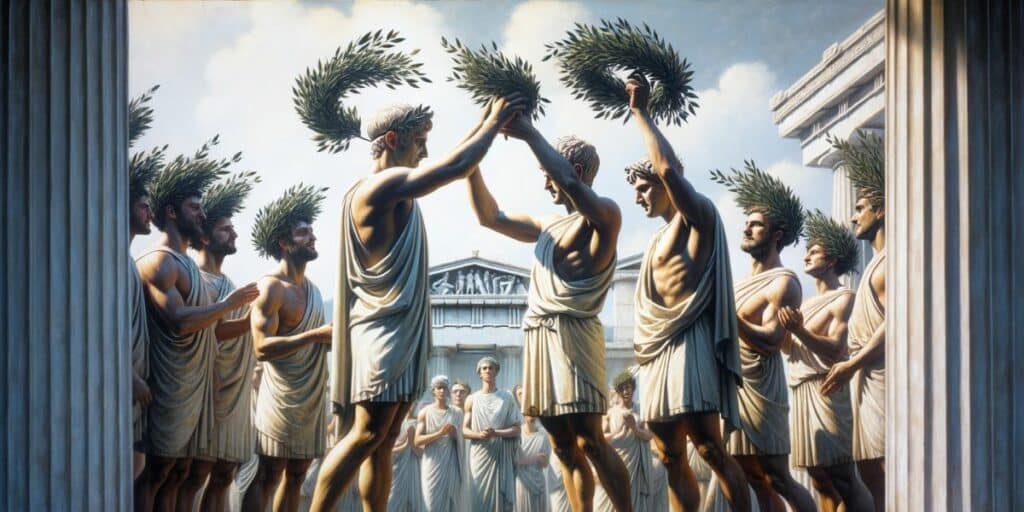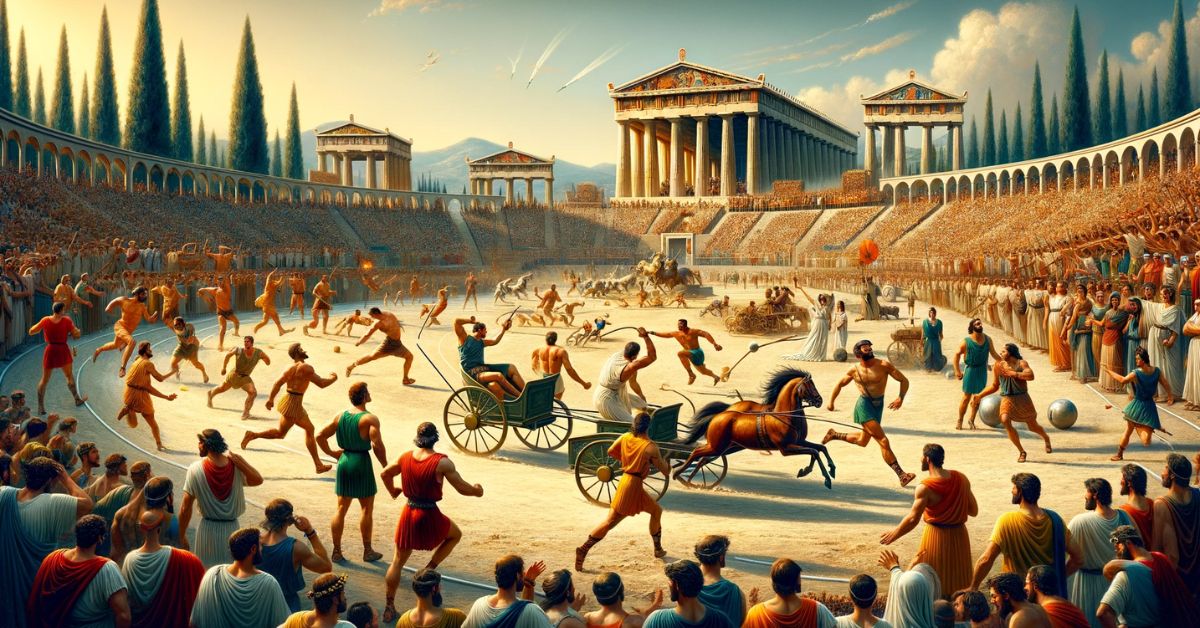The Ancient Olympic Games, a cornerstone of our modern international sports spectacle, have a rich and fascinating history that dates back to ancient Greece. This comprehensive exploration delves into these historic games’ origins, evolution, and cultural impact, illuminating how they laid the foundation for today’s global athletic competitions.
When did the ancient Olympic Games begin?
Tracing its origins to 776 B.C., the Ancient Olympic Games were more than just a sporting event; they reflected Greek life.
Emphasizing the harmony of physical prowess and intellectual strength, these games were a testament to the Greek belief in a balanced existence. Athletics, revered in both art and literature, became synonymous with the Greek aristocratic lifestyle, celebrating physical abilities as much as intellectual acumen.
What Games were played in the Ancient Olympic Games?
The Ancient Olympic Games, a cornerstone of ancient Greek culture, blended athletic competitions and religious celebrations. Initially, these games encompassed a day of racing and wrestling, but over time, they evolved significantly.
Also Read
By the 5th century B.C., the Olympic Games and other notable Greek contests such as the Pythian, Isthmian, and Nemean Games had transformed into elaborate multi-day events. This expansion included diverse athletic contests for youths and men, evolving into a festival that celebrated physical prowess and religious devotion over five days. The events featured included chariot racing, single-horse races, wrestling, discus, boxing, javelin, long jump, and various forms of running, some of which were conducted in armor or even in the nude.
These games were also known for the “sacred truce,” a remarkable aspect that underscores their role in fostering unity and cooperation. This peace declaration, sent throughout Greece, suspended conflicts for about three months, allowing safe passage for athletes and spectators alike. This truce highlighted the games’ ability to transcend the usual strife of the era, bringing people together in the spirit of athletic competition and communal celebration.
In terms of participation, most Greek athletic events were focused on individual prowess. Competitors were typically segregated into separate age groups for boys and men. However, Sparta stood out as a unique exception, being the only city-state that allowed girls to participate in these contests, showcasing its distinct approach to gender roles in athletics.
What is the venue of the ancient Olympics?
The games were invariably linked to religious festivals and took place in stadiums, similar to modern times. Many Greek cities boasted gymnasiums – spaces for leisure and athletics, featuring open grounds and shaded groves, complete with bathing facilities for post-exercise care.
These venues were not just for competition; they were centers of community and culture.
What were the prizes in the ancient Olympic games?
Victors in the Ancient Olympic Games received modest rewards – crowns of wild olive leaves and promises of eternal glory. Returning champions were often greeted with grand celebrations and lifelong honors, reflecting the high esteem in which athletic prowess was held.

One fascinating legend speaks of an Olympic runner who, despite losing his shorts mid-race, won and inspired the tradition of competing nude. This practice offered artists and sculptors of the era intimate familiarity with the human form, influencing much of the period’s art.
Controversies and Scandals in Ancient Olympic History
Despite their noble ideals and emphasis on honor, the Ancient Olympic Games were not immune to controversies and scandals, much like the modern sporting world. These instances of deceit and manipulation reflect the universal human desire to win, sometimes overriding the principles of fair play and integrity.
One of the most significant forms of scandal in the Ancient Olympic Games was bribery. Wealthy competitors or city-states sometimes bribe athletes or officials to secure a favorable outcome. This corruption tarnished the games’ integrity and reflected the broader political and social dynamics of ancient Greece, where power and influence were often wielded unscrupulously.
A particularly striking example of these ancient controversies involved Roman Emperor Nero. Known for his eccentricities and desire for artistic recognition, Nero participated in the Olympic Games of 67 A.D. His participation itself was a break from tradition, as the games were typically reserved for Greek athletes.
Nero entered a chariot race, an event he was ill-prepared for. He was thrown from his chariot during the race and was declared the winner. This dubious victory was widely seen as a result of his imperial status rather than athletic merit. Furthermore, Nero also added a singing and lyre-playing contest to the games, competitions in which he conveniently emerged victorious. These events were considered rigged by many contemporaries and historians, exemplifying how power and prestige could corrupt the spirit of fair competition.
These incidents of cheating and bribery had a profound impact on the reputation of the Olympic Games. While the games were intended to celebrate physical prowess, skill, and the honor of representing one’s city-state, these scandals introduced a sense of cynicism and mistrust. It highlighted the vulnerability of even the most respected institutions to human flaws and societal pressures.
The Modern Olympic Games
The journey from the last Ancient Olympic Games in 393 A.D. to the revival of the modern Olympic Games in 1896 encapsulates a remarkable chapter in sports history. This resurgence rekindled the spirit of the ancient Greeks. It redefined the global athletic landscape, evolving into a unifying global event celebrating excellence, diversity, and peace.
The Ancient Olympic Games ended abruptly under the rule of Theodosius I, who banned them in 394 A.D. due to their perceived unruliness and pagan associations. This decision, coupled with Theodosius II’s later decree to demolish pagan temples, led to the decline and eventual obscurity of the Olympic site at Olympia. It wasn’t until the 18th century that the site was rediscovered, leading to significant archaeological work. The establishment of the Archaeological Museum at Olympia marked a significant step in preserving and honoring the legacy of the ancient games.
The revival of the Olympic Games in Athens in 1896 symbolized a return to the ideals of ancient Greece, emphasizing unity, sportsmanship, and the pursuit of excellence. Spearheaded by French educator and historian Pierre de Coubertin, this revival sought to bring nations together through sports, inspired by the ancient tradition. The 1896 Olympics, featuring 13 nations and nearly 300 athletes, marked the beginning of the modern Olympic movement.
Since their revival, the modern Olympic Games have seen several significant developments:
- Women’s Participation: Women first competed in the Olympics in 1900, a milestone in promoting gender equality in sports.
- Introduction of the Olympic Flame: The Olympic flame, introduced in 1928, symbolizes the connection between the ancient and modern games. The torch relay, starting in Olympia and culminating at the host city, serves as a powerful reminder of the game’s historical roots and global reach.
- Cancellations and Challenges: Despite facing cancellations during World Wars I and II (1916, 1940, and 1944), the games have shown resilience, adaptability, and growth in scope and scale.
Today, the Olympic Games are more than a sporting event; they are a global phenomenon that transcends cultural and geographical boundaries. With every iteration, the games have embraced technological advancements, inclusivity, and a commitment to promoting peace and understanding among nations. The Olympics serve as a platform for athletes from diverse backgrounds to showcase their talents and for countries to engage in peaceful competition, fostering international camaraderie.
This exploration into the Ancient Olympic Games reveals their historical significance and enduring influence on modern sporting culture. The games were more than competitions; they were expressions of values, community, and the pursuit of excellence – ideals that continue to inspire athletes and nations worldwide.






